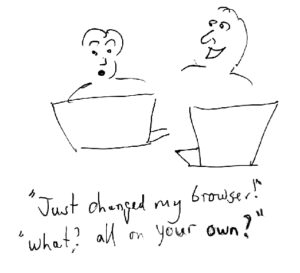 |
| ROSE is the rapidly growing Ads Booking System. Anna Danielewska-Tulecka is the leader of the Rose team located in Kraków. |
My team – Rose Team – is a part of Schibsted Products & Technology, set up to ensure Schibsted Media Group is ‘not just ready for the future, but actively helping to design and create that future’. We and other STP (Schibsted Tech Polska) teams are involved in the reorganisation of the whole Schibsted company structure.
Challenge the status quo

The reorganisation is a great opportunity for all of us to shape the culture in which we work. Where employees are intensely committed to shared values, a strong, rich culture can exist, but challenging these values and thinking independently will enrich the culture even further. In Bridgewater Associates, the world’s largest and probably weirdest hedge fund, employees can even be fired for not challenging the status quo. One of the principles is ‘No one has the right to hold a critical opinion without speaking up about it‘. The commitment is to promote dissent and diversity is a core value.
I first read about the Bridgewater culture in a fascinating book entitled Originals: How Non-conformists Change the World by Adam Grant. This book, and the Team Dynamics Workshop I attended as a part of the SPT Advertising Team, encouraged and inspired me to improve not just my workplace…
Find the fault in default
In Originals Grant describes how the employees who changed browsers to Firefox or Chrome were more successful than those who stayed with Internet Explorer and Safari (a correlation only discovered by chance, read more here). These employees took initiative and changed the default browser. ‘That act of initiative, however tiny, is a window into what you do at work’ and maybe that’s the first step to creating the job you really want…

I have no doubt that in Schibsted Tech Polska (STP) we have enough initiative to question the defaults and try out new solutions. These, if tried out by peers and proven right, can become the new defaults. We already have impressive stories in STP, such as project ‘Fastenposten – radical web performance optimisation‘, started by three developers during the Hackday. “It is a cool story of how forces from below, against all odds, managed to demonstrate a superior idea and gradually built consensus. And today everyone agrees it is the way to go”, says Hans Martin Cramer, the Product Manager Core/Fasten. The lightweight Fasten framework is nowadays the framework for Schibsted Norway’s online newspaper portfolio.

Take the Canary with you
I see the Fasten team – and several others – as a part of the Schibsted “Canaries” group. In Google, “Canaries” are trusted engineers across the company who represent diverse viewpoints and have a reputation both for being sensitive to adverse conditions and for speaking their minds (see here). Before Google’s People Operations Team introduces a major change in policy, they often run it by the Canaries for critical feedback. That’s how ‘the biggest complainers can become the strongest advocates of a change’.
Lisa Bodell, CEO of Future Think, has a “Kill The Company” exercise she uses to give canaries a voice. In the exercise a group is invited to spend an hour brainstorming how to put an organisation out of business. The most serious threats are listed and the group then discusses ways to convert these threats into opportunities, turning them from a defence to an offence.
Developers and IT experts are usually aware that change is inevitable and it had better be embraced. They are however less aware that it often comes through criticism. Constructive criticism could be warmly welcomed by organisations, particularly when we welcome new people on board. Asking new hires for ideas when they join the company could become a part of the on-boarding process: it offers new perspectives on challenges and makes new hires feel immediately valued. Did I mention that we are looking for developers and the big factor is not only tech expertise but also a preparedness to challenge our solutions, learn and create anew?
Ray Dalio from Bridgewater Associates
What’s your score?
Back to Bridgewater, although everyone’s opinions are welcome not all of them are equally valued. Employees have a “believability score” across a range of values, skills and abilities. These cover areas such as high-level thinking, practical thinking, maintaining high standards, determination, open-mindedness, etc. Baseball cards displaying these statistics for every person can be accessed by anyone at the company.
At the Team Dynamics workshop in London, I had a chance to see how being so open about each other can enrich communication. Understanding “where the other person is coming from” can help in discussions and in building a successful product together. The same applies to solving complex problems – only talking openly about them can lead to the solution. The ‘baseball card’ system could, in my opinion, work well among well-acquainted colleagues already on friendly terms. At Bridgewater, during regular review cycles, employees rate one another on different qualities but also give real-time, open feedback to anyone in the company at any time. Tact is a prerequisite!

Schibsted already surveys and evaluates all employees personally. Why not use this opportunity to create our own ‘baseball cards’ – mini, practical CVs at a glance – and open ourselves to not-always-nice feedback and take the initiative more often? Radical honesty is scary, I admit, but I hope nobody will think me a crackpot!
All quotes if not marked otherwise come from Originals by Adam Grant. Cartoons by David Hughes. Proofread by Stuart Carter. Blog ninja: Gosia Szewczuk.





